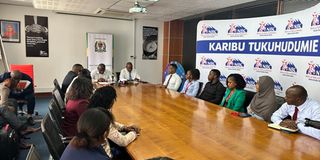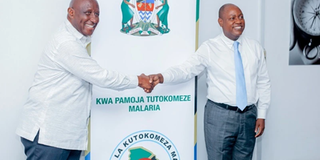Safeguarding Tanzania’s growth means ending malaria

Co-chairs of EMC Tanzania speaks during a World Malaria Day media briefing.
What you need to know:
- Tanzania is still among the top ten countries with the highest malaria burden in the world. For a nation with so much promise, this is a weight we can no longer afford to carry.
By Hon. Jenista Mhagama (Mb), Minister for Health, and Eng. Leodegar Tenga, Chair, End Malaria Council Tanzania
Tanzania is steadily carving out its place as one of East Africa’s most promising economies. Slowly but surely, our economy is growing, driven by how hard our people are working across the country as they build businesses, feed families, and push the nation forward.
Agriculture continues to support millions of households. Mining is creating jobs and bringing in much-needed revenue. In factories and workshops, manufacturing is picking up. Our tourism sector is recovering and attracting visitors to our parks, heritage sites, and coastal towns. And across the great lakes, Victoria, Tanganyika and Nyasa, fishing continues to feed families and power local markets.
All this progress rests on something more valuable than minerals or machines; our people. Tanzania’s strength is its workforce, especially the young men and women who keep the economy moving. To stay on this path, we must take care of them. That starts with protecting their health.
The hidden cost of malaria
Even as our economy grows, one disease continues to quietly hold us back. Malaria. It is one of the oldest illnesses we know, yet it remains among the most damaging. It takes time, money, and lives. It keeps children from school, workers from jobs, and communities from reaching their full potential.
Tanzania is still among the top ten countries with the highest malaria burden in the world. For a nation with so much promise, this is a weight we can no longer afford to carry.
Without malaria, our families would thrive. Parents could work with peace of mind. Children would stay in school. Health systems would be less strained. Industries would lose fewer workdays and our economy would grow stronger across every sector.
What more is needed
This is why Tanzania is not standing still. Malaria is now part of our primary healthcare system. We continue prevention efforts with mosquito nets, indoor spraying, and a stronger focus on high-risk areas.
Our disease tracking is improving, supported by tools like the national malaria scorecard, which helps monitor progress and accountability at every level. We are also testing new tools developed and used right here at home.
Statistics in our country show that the rate of malaria infections has decreased by approximately 45%, from 14.8% in 2015 to 8.1% in 2022. Additionally, the number of confirmed malaria cases has dropped by 45%, from 6.0 million cases in 2020 to 3.3 million in 2024.
The number of patients hospitalized due to malaria has decreased by 33%, from 306,633 in 2020 to 206,453 in 2024, the number of deaths caused by malaria has dropped by 39%, from 2,460 in 2020 to 1,503 in 2024.
The number of regions with malaria infection rates below one percent has increased from five regions in 2020 to nine in 2024, and the number of councils with such low rates has increased from 36 in 2020 to 51 in 2024. These regions are Arusha, Kilimanjaro, Manyara, Singida, Dodoma, Songwe, Iringa, Dar es Salaam, and Mwanza.
But even with these gains, we know that good plans and technical teams are not enough. Ending malaria takes leadership across all sectors, and it takes resources, especially from within.
The truth is that no health system can run without steady investment. International support has helped us come far, but we must now carry more of the responsibility ourselves. We can no longer treat domestic resource mobilisation as an afterthought. It must shape how we plan, prioritise, and protect what we’ve built.
That means committing more from national and local budgets. It means working with the private sector in real partnership. And it means making sure malaria is part of every ministry’s plan; from education and agriculture to trade, mining, and local government, among others.

Co-chairs of EMC Tanzania shakes hands during a World Malaria Day media briefing.
The funding challenge before us
This is especially important now. Earlier this year, the United States government made the difficult decision to pause bilateral funding for malaria through the President’s Malaria Initiative across 27 countries. Tanzania is one of 27 countries affected by this decision.
While some commodities are still arriving through existing pipelines, the funding suspension has created serious uncertainty and limited flexibility to plan ahead. According to modelling by the Malaria Atlas Project, the resources lost could have helped prevent nearly 15 million cases and saved over 100,000 lives across Africa, many of them young children.
Here at home, the pressure on already stretched services is growing. Health workers are doing more with less. Supplies are running low. The risk of resurgence is real.
The government is doing what it can such as reallocating funds, reviewing priorities, and trying to close the most urgent gaps. But like many African countries, we don’t have the space in our budgets to fill a hole this size overnight.
Even so, we are pushing forward. We are focusing efforts in the hardest-hit regions, strengthening community health structures, and improving coordination between programmes.
The Government under the leadership of Her Excellency Dr. Samia Suluhu Hassan, has assessed the impact of the reduced external support and has already undertaken measures to sustain the availability of commodities for Malaria, TB and HIV/AIDS.
The government has allocated a total of Tsh 10 billion for the purchase of biological larvicides from the Tanzania Biotech Products Ltd factory located in Kibaha, Coast Region, to facilitate the implementation of the larvicide spraying intervention in all 184 councils across the country.
A homegrown response that brings sectors together
This is where the End Malaria Council plays its part. It brings together leaders from government, faith communities, business, and civil society to support practical malaria solutions. Whether it is a company spreading awareness at the workplace or a church encouraging net use in remote villages, this is Tanzania coming together around a shared goal.
Across the continent, End Malaria Councils have helped raise over 125 million dollars for national malaria responses. Here in Tanzania, we are part of that movement.
Our Councils continue to expand partnerships. We are working with faith leaders to reach communities every week through sermons, outreach, and household visits. We are encouraging more direct engagement from the private sector.
And we are partnering with sports organisers, including those behind the forthcoming CHAN 2025 and AFCON 2027 football tournaments, to bring malaria messages into stadiums, commentary, and culture.
Football speaks a language people understand. It brings us together. When players and coaches talk about malaria, or when prevention messages are woven into match day, the conversation continues well beyond the pitch. Health becomes something people carry with them.
But while these efforts matter, the challenges remain serious. We still face funding shortfalls. We still face supply gaps. And we still face a disease that adapts and strikes hardest in places where people have the least. We cannot afford to lose momentum now.
We know what works. We have the experience. We’ve built systems. And we’ve come too far to step back. What we need now is for everyone to lean in, government, partners, businesses, and communities. We need to keep going until malaria is no longer part of our national story.
Tanzania bila malaria inawezekana. But it will take all of us, doing our part, and staying with it, until the job is done. As we mark World Malaria Day, let it be a reminder, and a call, to finish what we started. Zero Malaria inaanza na sisi.
About the authors:
Hon. Jenista Mhagama (Mb) the Minister for Health of the United Republic of Tanzania.
Eng. Leodegar Tenga the Chair of the End Malaria Council Tanzania and Executive Director of the Confederation of Tanzania Industries (CTI). He previously served as President of both the Tanzania Football Federation and CECAFA.




